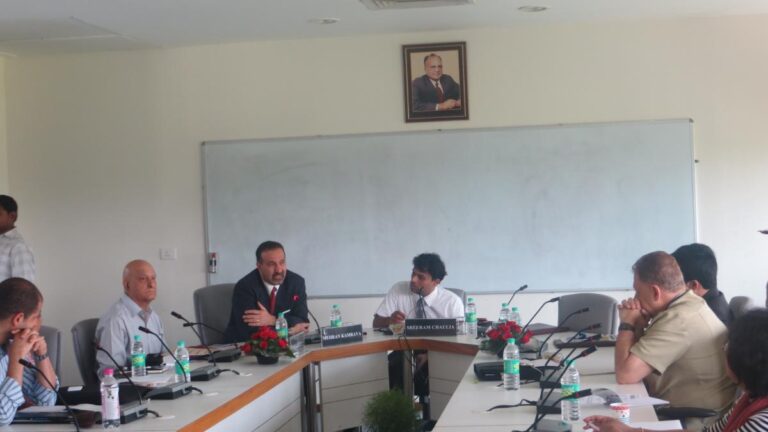Regional Studies
CIRS Travels to New Delhi

As part of the Georgetown University School of Foreign Service in Qatar’s efforts to foster academic and institutional linkages with organizations around the world, members of the Center for International and Regional Studies, SFS-Q faculty, and Georgetown University staff traveled to New Delhi, India, on May 13-17, 2014. During the four day trip, the cohort of Georgetown community members held an alumni reception and met with various research foundations, policy think tanks, and universities in India including: the Observer Research Foundation, Delhi Policy Group, and Jindal Global University – School of International Affairs. During each of these visits, SFS-Q faculty and CIRS researchers—Mehran Kamrava, Abdullah Al-Arian, Mark Farha, Gary Wasserman, and Zahra Babar—gave talks pertaining to their respective areas of research and engaged in academic discourse and dialogue with professors, researchers, dignitaries, and students based in India. Linking the Gulf region to India, professors from Doha and researchers, dignitaries, and UN officials from India discussed issues of mutual interest and concern in the West Asia region—particularly, in the context of “Nuclear Trends in West Asia,” and “Regional Responses to the Iran Nuclear Deal” during the visit to the Observer Research Foundation. Broadening the geographic area of focus, SFS-Q faculty gave talks at the Delhi Policy Group on “Changing dynamics in West Asia, the Persian Gulf, and the Middle East,” addressing issues related to Iran and Persian Gulf security and evolving domestic political dynamics in Egypt. At Jindal Global University – School of International Affairs, students, professors, researchers, and journalists gathered for a workshop on “Internal and External Dynamics in the Middle East Post-Arab Spring.” During the meeting, participants covered an array of research areas ranging from external and internal security in the Gulf, to the “stalled revolution in Egypt” and sectarianism in the Middle East.
These various engagements enabled participants to explore and exchange research on the Middle East and India, linking the two regions academically and having a dialogue on geographic, social, political, and economic connections. The meetings also provided SFS-Q faculty with a platform for professional development. The professors were able to give multiple talks, share their research and insights with the various organizations, and additionally benefit from the expertise and knowledge of their counterparts at various policy and academic research institutions and universities in India.